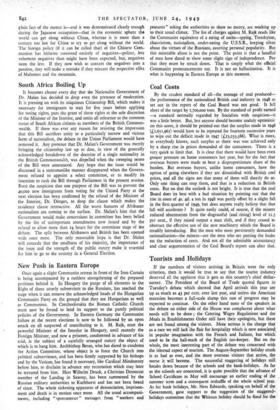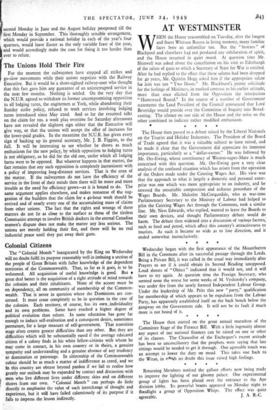Tourists and Holidays
If the numbers of visitors arriving in Britain were the only criterion, then it would be true to say that the tourist industry deserved all the applause that it gets as this country's chief dollar- earner. The President of the Board of Trade quoted figures in Tuesday's debate which showed that April arrivals this year are up as much as 43 per cent. over last year, and unless the American recession becomes a full-scale slump this rate of 'progress may be expected to continue. On the other hand none of the speakers in the debate on either side of the House was complacent about what needs still to be done ; the Catering Wages Regulations 'and the Meals in Establishments Order still have their apologists, but these are not found among the visitors. More serious is the charge that as a race we still lack the flair for hospitality which is now associated in popular imagination with the French and Italians, but which used to be the hall-mark of the English inn-keeper. But on the whole, the most interesting part of the debate was concerned with the iriternal aspect of tourism. The August-September holiday crush is as bad as ever, and the more overseas visitors that arrive, the worse it will become. The successful staggering of holidays still breaks down because of the schools and the bank-holidays. As far as the schools are concerned, it is quite possible that the advance of School Certificate to May will encourage an earlier ending of the summer term and a consequent reshuffle of the whole school year. As for bank holidays, Mr. Ness Edwards, speaking on behalf of the Government, gave support to the suggestion of the staggered- holidays committee that the Whitsun holiday should be fixed for the
second Monday in June and the August holiday postponed till the first Monday in September. This thoroughly sensible arrangement, which would provide a national holiday in each of the year's four quarters, would leave Easter as the only variable feast of the .year, and would accordingly make the case for fixing it too harder than ever to refute.



































 Previous page
Previous page